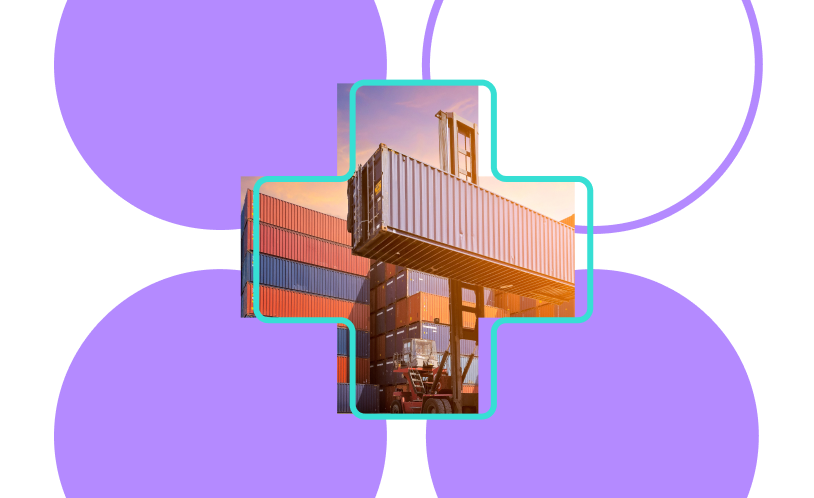If a freight forwarder – the individual or company that manages your international freight shipment – gives you a rate that sounds too good to be true, then it probably is.
Many promise the world but underdeliver.
Literally.
That’s why it’s important for you to understand the costs and fees included in your forwarder’s shipping estimate.
This plain-English guide breaks down how to determine what you’re seeing in that freight quote and if that low rate is as great a bargain as it seems.

Looking For Live Quotes From Vetted Providers?
What is a typical Freight Forwarder cost structure?
Freight forwarders sometimes attract inexperienced shippers with low upfront prices, only to impose unexpected charges later. Understanding the costs associated with freight forwarding is crucial for shippers to avoid surprises and save money. Key expenses include transportation, customs duties, documentation, storage, insurance, and handling fees. Shippers should educate themselves to make informed decisions and communicate clearly with freight forwarders to ensure transparency in pricing.
That is why having even an elementary idea of the costs involved when employing a freight forwarder can help you save time and money.
And stress.
So. Much. Stress.
Let’s take a look at the charges you must know:
Cargo Type
The simplest costs to understand are the ones associated with your cargo type.
After all, you probably have a pretty good idea about the product that you’re importing.
If your product is perishable, OVERSIZED, or hazardous and requires a special container or careful handling, it’s obviously going to cost more.
Less obvious is a product that requires FDA oversight. Items like makeup and drugs typically incur an FDA filing fee.
Know your cargo type to avoid any surprises down the road.
Weight and Volume
The weight of your shipment is equally important to the volume of your shipment because either one can determine your cargo’s chargeable weight.
The cost to ship your cargo is determined by comparing the actual weight and the volumetric weight. The greater of the two is the one that is used to determine how much you will be charged.
If your goods are light, but take up a lot of space, they might be more expensive to ship than something very dense, but smaller.
[tip] Weight and volume are two important considerations people make when sourcing goods. [/tip]
Packing and Palletization
A shipping container is like a puzzle – when it’s loaded, the pieces (ie, the cargo) need to fit precisely in order to make the best use of the space.
This is achieved through proper packing and palletization.
Most forwarders offer this service at an additional charge, but you should make sure that the one you’re working with understands the legislation of the country they’re shipping to.
It’s also important to understand the different options when it comes to the containers themselves…
Container Costs
Generally speaking, containers come in two sizes:
- 20-foot equivalent (TEU)
- 40-foot equivalent (FEU)
Where your shipment gets placed depends on its size.
But what happens if you don’t require the full capacity of a container?
The fact is that most shipments don’t require a full container load (FCL), so they are combined with other shipments in a single unit and you are only charged for the space your goods occupy. This is called less-than-container load (LCL).
Note: Air freight containers have their own sizes.
Carrier Costs
All those charges and we’ve only just arrived at the principal cost of any shipment!
The carrier cost is the expense associated with sending your shipment by land, sea, or air and moving it to its destination port.
There are two factors that influence this cost:
- Distance Travelled
- Route Popularity
Distance traveled is an obvious influencer as it stands to reason that sending something further away is more costly than sending it to a nearby location.
But routes that are more frequently traveled tend to be less expensive than less common routes. In those cases, sending goods further might be cheaper.
Documentation Fees
There are over one hundred documents that can play a role in freight shipping.
Thankfully, there are really only nine that you need to know… Unless you’re shipping plutonium.
Pretty much every freight forwarder will know exactly what documents need to be included with your shipment and documentation fees are always included as part of your initial quote.
If your goods require special documents, your forwarder costs will be greater.
Insurance
All carriers are required to have liability insurance, but your shipment is vulnerable if it doesn’t have additional coverage.
Forwarders know this and some are so controversy-averse that they include additional insurance as part of their rate so as to avoid any quarrels with you later on.
Other forwarders simply make it available as an add-on service.
You can purchase cargo insurance from a third-party insurer if your forwarder does not offer it.
Administration Charge
Freight forwarders simplify the complex process of sending your freight where it needs to go.
For that, they take a much-deserved fee.
Think about it: the organization, coordination, and management of shipping freight takes a lot of time to perform and even longer to perfect.
Just keep in mind that a higher administration charge does not necessarily correlate with a higher level of service.
Additional Freight Forwarder charges
The more freight you ship, the more you will encounter the bane of the common shipper:
Surcharges and fees.
Additional costs can come up at any point in the shipment process, be it before, during, or even after main transit.
Common additional freight forwarder charges include the Currency Adjustment Factor (CAF), the Fumigation Fee, and ISPS fees.
Others, like the War Risk Surcharge, are much, much less common.
You can learn more about surcharges and fees in our complete guide.
How much do Freight Forwarders charge?
The pricing structure of freight forwarders is a nuanced and multifaceted aspect of international shipping logistics. Unlike off-the-shelf products with fixed prices, freight forwarding services are highly tailored to the unique needs of each shipment. This means that determining the cost of a freight forwarder involves navigating a complex web of variables and considerations.
Freight forwarders operate in a dynamic environment where the range of services they provide can vary significantly. Some forwarders may include certain costs upfront in their pricing, while others offer these as optional add-ons, allowing clients to customize their shipping solutions. Additionally, some forwarders specialize in specific services, while others offer a broader range of logistics solutions.
In light of this, it becomes paramount for businesses to ask the right questions when seeking the services of a freight forwarder. Instead of merely inquiring about the bottom-line cost, it’s crucial to delve into the specifics of what is included in the freight quote. What services are covered? Are there additional fees for specific tasks or services? How are customs duties and taxes handled? What about insurance coverage?
In essence, the cost of a freight forwarder should be viewed not in isolation but as part of the broader value proposition that encompasses expertise, efficiency, and reliability in managing the intricacies of international shipping.
There is no off-the-shelf solution to freight and, as such, determining the cost of a freight forwarder is not simple.
That’s because there are literally dozens of variables that go into calculating the cost of a freight forwarding service. Some forwarders include certain costs upfront, while others offer them as an option.
Others may not offer specific services at all.
That’s why it is important to ask the right questions.
Rather than asking what a forwarder charges, inquire about what you are getting as part of your freight quote.
What are Freight Forwarding invoices
A freight forwarding invoice is an invoice of all your freight charges.
It includes the costs of all the services your freight forwarder provides in moving your goods from origin to destination. This financial record serves as a crucial component of the transaction between a shipper and their chosen freight forwarding service.
Within this invoice, various charges are meticulously itemized, covering a spectrum of services provided by the freight forwarder throughout the shipping process. These charges may encompass but are not limited to:
These detailed invoices not only provide transparency in terms of cost breakdown but also serve as essential financial documentation for both the shipper and the freight forwarding company. They help in tracking and verifying the expenses associated with the transportation of goods, facilitating accurate financial record-keeping, and aiding in budgeting for future shipments. The clarity offered by freight forwarding invoices is vital for establishing a transparent and trustworthy relationship between shippers and their logistics partners.
Pro Forma VS Final Invoice
If you ship on Freightos.com, you will receive a pro forma, or non-final, invoice before you place your freight booking. A pro forma invoice lists all the freight charges in your freight quote, including carrier fees, handling charges, port fees, and insurance.
After your goods are delivered, you’ll receive a final invoice, also known as a tax invoice, which finalizes your freight costs. This invoice includes your original charges, plus costs for customs duties and any storage, chassis, or other fees not included in your original quote. (Don’t worry, in many cases, you can lower or prevent these costs with a little advance planning – see here for details).
For Freightos.com shippers, the final invoice will arrive 14 days after delivery for ocean and air shipments and 20 days after delivery for Express shipments.
What to look for in your Freight Forwarding invoice
Your freight forwarding invoice should include charge lines to describe each freight charge.
Whether you are shipping on Freightos.com or not, make sure to review your freight forwarding invoice and check that costs are broken down so that you understand exactly what you’re paying for. If your invoice gives you one flat fee without specifying individual costs, or if not all the charges make sense to you, ask your freight forwarder to explain. You should have full transparency when it comes to your freight invoice.
Is it best to use a cheap Freight Forwarder?
If you are considering using a cheap freight forwarder, it’s worth figuring out why they cost less than everyone else.
Some questions you might ask are:
- How far will they take my shipment in the delivery process (ie, destination port vs. factory gate)?
- What are they not offering me that others would?
- Are they reputable and have people shared their own experiences with them online?
Sometimes a service is inexpensive for a reason. It’s up to you to dig a little to figure out if that reason will negatively affect you.
How much does a Freight Forwarder cost? Get a quote online now
Freightos makes it easy to get an instant quote from dozens of freight forwarders.
For a freight estimate, you can reference the freight forwarding cost calculator:
For an instant quote, you can search the Freightos marketplace where you will find hundreds of sortable results created just for you — all with a clear breakdown of charges.



